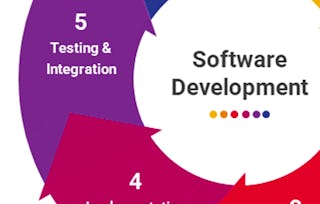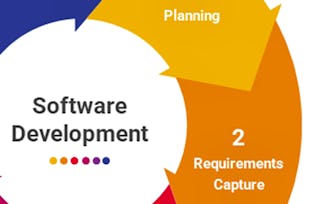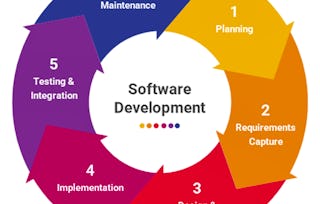Software Development Life Cycle (SDLC) is the process of developing software through planning, requirement analysis, design, implementation, testing, and maintenance. This course focuses on the project planning and analysis/design phases of SDLC, and you will learn about different architectural patterns and design patterns to solve common problems in software design. It covers project planning, scheduling, and cost estimating, which are the principal tasks of software project managers.

Software Engineering: Software Design and Project Management

Software Engineering: Software Design and Project Management
This course is part of Software Engineering Specialization

Instructor: Kenneth Wai-Ting Leung
22,947 already enrolled
Included with
195 reviews
Recommended experience
Skills you'll gain
- Software Engineering
- Software Design
- Software Design Patterns
- Quality Assurance
- Project Planning
- Software Architecture
- Process Driven Development
- Software Development Life Cycle
- Systems Development
- Unified Modeling Language
- Systems Design
- Systems Analysis
- Project Management
- Object Oriented Design
- Skills section collapsed. Showing 8 of 14 skills.
Details to know

Add to your LinkedIn profile
6 assignments
See how employees at top companies are mastering in-demand skills

Build your subject-matter expertise
- Learn new concepts from industry experts
- Gain a foundational understanding of a subject or tool
- Develop job-relevant skills with hands-on projects
- Earn a shareable career certificate

There are 6 modules in this course
Welcome to the first module of this course! In this module, you will learn: (1) The purpose and importance of system analysis and design. (2) The major activities that take place during system analysis and design. (3) How to realize design goals and deal with the implementation environment. (4) What are architectural patterns and design patterns and when to use them.
What's included
4 videos3 readings1 assignment
In this module, you will learn: (1) How to use a state machine diagram to describe the behavior inside an object.
What's included
2 videos3 readings1 assignment
In this module, you will learn: (1) A design pattern is a general reusable solution to a commonly occurring problem in software design. (2) Strategy Pattern. (3) Observer Pattern.
What's included
3 videos3 readings1 assignment
In this module, you will learn: (1) Mediator Pattern. (2) Proxy Pattern. (3) Bridge Pattern. (4) Singleton Pattern. (5) Factory Pattern. (6) When to use design patterns. (7) Anti Patterns.
What's included
5 videos3 readings1 assignment
In this module, you will learn: (1) The quality assurance process and the central process activities of quality assurance, quality planning and quality control. (2) The quality assurance process and the central process activities of quality assurance, quality planning and quality control. (3) The principles of software development process improvement and why process improvement is worthwhile.
What's included
4 videos1 reading1 assignment
In this module, you will learn: (1) The principal tasks of software project managers. (2) The need of project planning in all software projects. (3) Requirements for staffing and scheduling in software projects. (4) Techniques for estimating the size and cost of software development. (5) Project tracking and control.
What's included
3 videos1 reading1 assignment
Earn a career certificate
Add this credential to your LinkedIn profile, resume, or CV. Share it on social media and in your performance review.
Instructor

Explore more from Software Development
 Status: Free Trial
Status: Free TrialThe Hong Kong University of Science and Technology
 Status: Free Trial
Status: Free TrialThe Hong Kong University of Science and Technology
 Status: Free Trial
Status: Free TrialThe Hong Kong University of Science and Technology
 Status: Free Trial
Status: Free TrialAmazon
Why people choose Coursera for their career

Felipe M.

Jennifer J.

Larry W.

Chaitanya A.
Learner reviews
- 5 stars
75.51%
- 4 stars
16.32%
- 3 stars
4.08%
- 2 stars
2.04%
- 1 star
2.04%
Showing 3 of 195
Reviewed on Nov 28, 2022
it was a great experience to take this course. I gained and polished more upgradable skills from this course. all the contents are up-to-dated and flexible. highly recommended
Reviewed on Nov 20, 2022
I did not get my certificate even after passing ... idk why
Reviewed on Nov 19, 2022
Amazing helped me learn about many aspects and some domains which i never thought of . Thus this was very amazing course.

Open new doors with Coursera Plus
Unlimited access to 10,000+ world-class courses, hands-on projects, and job-ready certificate programs - all included in your subscription
Advance your career with an online degree
Earn a degree from world-class universities - 100% online
Join over 3,400 global companies that choose Coursera for Business
Upskill your employees to excel in the digital economy
Frequently asked questions
To access the course materials, assignments and to earn a Certificate, you will need to purchase the Certificate experience when you enroll in a course. You can try a Free Trial instead, or apply for Financial Aid. The course may offer 'Full Course, No Certificate' instead. This option lets you see all course materials, submit required assessments, and get a final grade. This also means that you will not be able to purchase a Certificate experience.
When you enroll in the course, you get access to all of the courses in the Specialization, and you earn a certificate when you complete the work. Your electronic Certificate will be added to your Accomplishments page - from there, you can print your Certificate or add it to your LinkedIn profile.
Yes. In select learning programs, you can apply for financial aid or a scholarship if you can’t afford the enrollment fee. If fin aid or scholarship is available for your learning program selection, you’ll find a link to apply on the description page.
More questions
Financial aid available,

